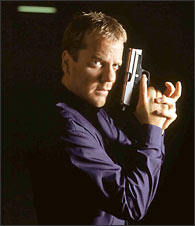It is said that journalists write the first draft of history. As the current U.S. administration limps into its final days, most current affairs commentators are already eagerly looking ahead to the Obama presidency, consigning the Bush regime to the archives, where it will be dissected by future historians.
But before they shut the vault in the basement, the current President and his proxies and spokespersons have done their best to stake out the ground for his legacy. The Administration's defenders have been busy laying out, sometimes retroactively, and occasionally in a revisionist manner, the overarching goals of the administration and the criteria by which Bush should be judged.
Bush's defenders often point out, for example, the fact that the United States has been free from terror attacks on its soil since 2001, and use it as justification for the many controversial policies the White House brought in following 9-11. They also point to the successful Iraq "surge", which was a measure that went against the prevailing media narrative and conventional wisdom of the time, which held that the war was lost and that the American military needed to extricate itself from a quagmire, as an example of Bush's leadership and his willingness to sacrifice political expediency in order to do what was right.
His critics, naturally, counter with examples of the many ways in which the President and his administration miscalculated, practiced petty politics, deceived, engaged in abuse of power, and generally failed the country. A good summary, drawing from a multitude of sources, can be found in An Oral History of the Bush White House, in the current issue of Vanity Fair.
The explanations offered for these failures are legion, but already, we see that a few of the old, easy favourites are being rebutted and discredited as serious, thoughtful observers weigh in with their impressions of the man that led the most powerful nation on earth for eight years.
As the Bush era comes to a close, it would appear that the old canard of the imbecilic president as religious zealot, a staple of hack comedians and lazy intellects for years now, has an increasingly limited shelf-life. Witness an exasperated Chris Hitchens go off on Bill Maher and his audience:
Richard Cohen recently noted in the Washington Post, that there may have been more than a bit of artifice in the President's public persona, a sort of pantomime stupidity of a type we once saw here in Canada during the Chretien Years, where a canny political player and longtime Ottawa insider at the centre of power for decades managed to portray himself as some kind of Shawinigan rube:
Still, the fact remains that Bush is a prodigious, industrial reader, and this does not conform at all to his critics' idea of who he is. They would prefer seeing him as a dolt, since that, as opposed to policy or ideological differences, is a briefer, more bloggish explanation of what went wrong. Still, in fairness to these critics (see Rove above), Bush himself has encouraged this approach. Aw shucks is an infuriating defense of a policy.
Let's just consign the "Bush is a moron" stuff to the dustbin of history. It is a silly slander that trivializes and dismisses the very serious issues that arose through the misadventures of his Presidency. It is far more disconcerting to think that a reasonably intelligent and well-meaning man could fail the test of leadership on critical issues like torture and the Constitution. That should be something serious to occupy our minds.

